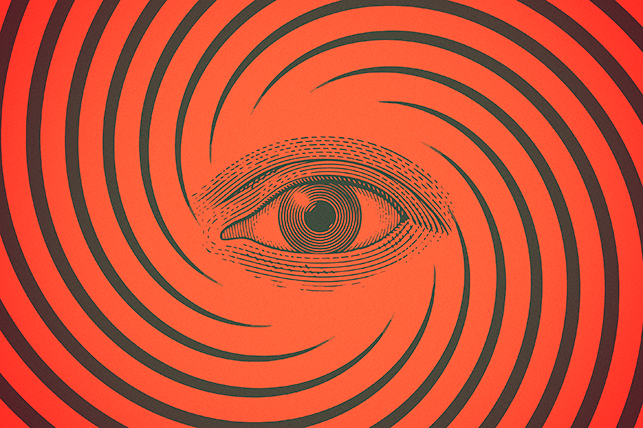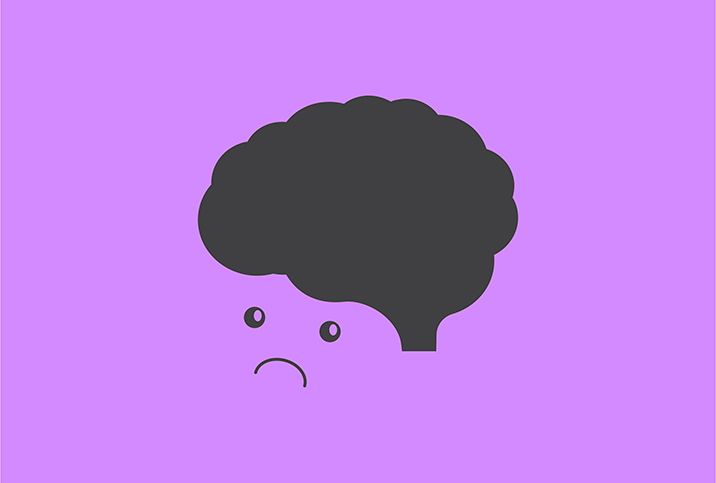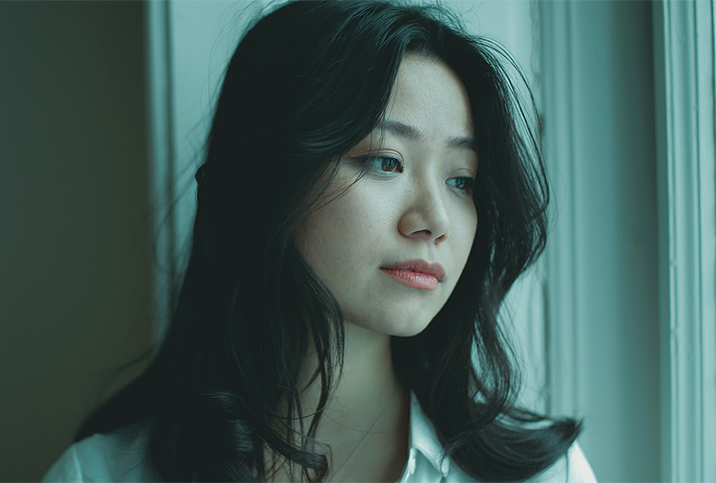When Depression Becomes Psychotic

Depression has a way of distorting reality. While in the depths of a depressive episode, it's not unusual to feel unlovable while in the arms of an adoring partner or to be totally convinced hope is futile despite having just received promising news.
For some people with severe depression, or major depressive disorder (MDD), reality may slip away entirely. This condition, known as depression with psychotic features or psychotic depression, involves the usual depressive symptoms accompanied by hallucinations or delusions.
Psychotic depression is a serious, potentially life-threatening illness that can pervade every aspect of a person's life, from emotional well-being to physical safety and sexual health. If you or a loved one are experiencing depression with psychotic features, it's time to find out more about the condition and how to cope.
Prevalence and risk factors
A 2013 study published in Schizophrenia Bulletin reported between 3 percent and 11 percent of people experience severe depression in their lifetime. Research suggests depression, in general, has become increasingly prevalent during COVID-19, and some estimates indicate the MDD incidence rate could be much higher.
To illustrate those trends, a 2018 study published in JAMA Psychiatry surveyed 36,309 adults in the United States and found the 12-month and lifetime prevalence of MDD was 10.4 percent and 20.6 percent, respectively. One conclusion was that not everyone with MDD develops psychosis, but according to the 2013 study, between 14.7 and 18.5 percent of people with MDD do.
Scientists aren't sure what causes depression or psychosis, but most posit there are multiple contributing factors, such as biological and environmental elements.
"Depression is complex and multifaceted, so there's no definitive way of knowing the exact cause," said Courtney Glickman, Ph.D., a licensed mental health counselor at the Collective Healing Center, based in Annapolis, Maryland. "This is true for those who experience psychotic features as well."
Some research suggests specific genetic mutations can increase a person's risk of developing depression, while other genetic variants increase the likelihood of psychosis. Several studies indicate people with a family history of psychiatric disorders are much more likely to develop one themselves, indicating these conditions are hereditary.
Inflammation and the hormone cortisol are thought to contribute to depression with psychotic features as well, according to Hayley Nelson, Ph.D., a neuroscientist and psychology professor in Philadelphia and the founder of the Academy of Cognitive and Behavioral Neuroscience, and Zishan Khan, M.D., a psychiatrist in Frisco, Texas, and regional medical director at Mindpath Health.
'Depression is complex and multifaceted, so there's no definitive way of knowing the exact cause.'
According to a 2012 report published in Current Topics in Behavioral Neuroscience, pro-inflammatory cytokines—chemicals produced by the immune system—affect neurotransmitter metabolism, the neuroendocrine system and regional brain activity. Cortisol, known as the "stress hormone," has similar effects and may influence gene expression, according to a 2013 study published in Biological Psychiatry.
Research has also found altered levels of neurotransmitters, such as dopamine, serotonin and norepinephrine, in people with depression. However, there's much debate as to whether neurotransmitter deficiencies cause depression or result from it.
Another possible trigger of psychotic depression is the use, even a one-time use, of substances such as cannabis and stimulants.
Anyone can develop major depressive disorder, but studies suggest some demographics are more susceptible than others, such as people assigned female at birth (AFAB), transgender people of any gender, older adults, people with a family history of psychiatric conditions, and those who've experienced trauma or abuse.
Not having a strong support network, being socially isolated and experiencing a major adverse life event may also increase a person's risk of developing MDD and psychotic depression, Khan said.
"In addition to dealing with severe stress and trauma, other factors include living with chronic health conditions or pain, having serious financial stressors and experiencing major hormonal shifts, such as during menopause or during the postpartum period," he added.
The reasons for MDD's demographics are multifactorial, he continued. For one, transgender people, people AFAB and older people are more likely to have experienced additional risk factors, such as trauma or severe stress. Also, people AFAB experience hormonal fluctuations that can affect brain chemistry and function. And older adults experience age-related cognitive changes that can raise the risk of psychiatric disorders.
Edward Ratush, M.D., a psychiatrist in New York City and founding partner at SohoMD, noted people AFAB and older people are also more likely to seek healthcare, increasing their likelihood of a diagnosis.
As for why adverse life events especially trauma, neglect or abuse in childhood may contribute to psychotic depression, Nelson explained it might be because such experiences can alter brain structure and function. Psychosis could also be a defense mechanism.
"Another theory is that psychosis may stem from the brain's natural defense mechanisms used to help the individual cope with stress," she explained. "This defense mechanism may manifest as psychosis, with the person experiencing delusions or hallucinations as a way of coping with the traumatic event."
Symptoms of psychotic depression
Depression is a broad term that can encompass various physical, psychological and physiological symptoms. A person must exhibit at least five depression symptoms for two weeks or more to be diagnosed with major depressive disorder. Some of the most common symptoms of depression include a persistent low mood, fatigue, sleep difficulties, inability to concentrate, loss of interest in once pleasurable activities, thoughts of self-harm or suicide, and feelings of worthlessness or guilt. Although they are not included in the criteria for diagnosis of depression, aches and pains and gastrointestinal symptoms are common as well.
In addition to these symptoms, people with depression and psychosis experience a break from reality in the form of hallucinations or delusions. Hallucinations involve seeing, hearing, feeling or otherwise sensing things that aren't real, while delusions are unshakable, false beliefs.
Symptoms of psychotic depression can mimic other illnesses, including manic depression with psychosis and schizophrenia. People who have psychotic depression experience psychosis strictly within the context of their depression, without accompanying manic episodes or breaks with reality when they aren't depressed. These psychotic episodes typically last for a few hours to several weeks, Ratush and Nelson explained.
'Those suffering from major depression with psychotic features are often ashamed of their symptoms and try to hide them...and thus, it can be very difficult to diagnose psychotic depression.'
What constitutes an "episode" can vary widely, according to Ratush and Khan. Generally, people with psychotic depression experience "mood-congruent" hallucinations, delusions and disordered thinking related to their depression, with themes of persecution, guilt, shame, sadness or hopelessness.
Another commonality is the presence of "overvalued ideas," according to Ratush.
"Overvalued ideas cause a person to become narcissistically the center of all the bad things that happen," he said. "Thinking, for example, 'I'm the reason we're in this terrible situation' or 'It's all my fault that my kids are sick' or 'I'm the reason why nothing good ever happens to us.' They think they're at the epicenter of all these terrible things. But in reality, most of it is completely out of their control. That's psychotic thinking. And it can lead down a path toward psychotic behavior, like suicide."
Khan noted some people with MDD with psychosis experience "mood-incongruent" psychotic features involving hallucinations, delusions or disordered thoughts that don't relate to their depressed mood, though this is less common. Others experience both mood-congruent and mood-incongruent psychosis.
"Those suffering from major depression with psychotic features are often ashamed of their symptoms and try to hide them, as opposed to sharing their unusual thoughts and beliefs with others around them, and thus, it can be very difficult to diagnose psychotic depression," he added.;
Impact on relationships and sexual health
For people with depression, symptoms such as fatigue, low mood, diminished self-esteem, and feelings of shame, guilt and hopelessness can impede the ability to forge and maintain personal connections. Accompanying psychosis can compound these challenges and present new ones, according to Gonzalo Laje, M.D., a psychiatrist and medical director at Washington Behavioral Medicine Associates in Friendship Village, Maryland.
"By itself, depression has an impact on overall well-being, and it has been shown to exacerbate many other health conditions, including sexual health," he noted. "When psychosis is added into the mix, it can create greater friction with a partner and lead to reactive, possibly dangerous behaviors."
People with psychotic depression often become anxious, paranoid and hypersensitive, and easily misconstrue others as being disappointed, upset or ashamed, according to Nelson and Khan. As a result, they may isolate themselves and, inevitably, push others away.
It's also not uncommon for people with psychotic depression to develop delusions that their partner is about to leave them or having an affair, Khan explained.
Additionally, although risky sexual behaviors are more prevalent in people experiencing mania, people with depression and psychosis are also at risk of making poor, impulsive decisions that are out of character for them, he continued.
"As psychosis interferes with a person's cognitive, affective and judgmental processes, it is important to consider how this plays a role in sexual functioning," Glickman said. "Issues such as sexual dysfunction and risky sexual behaviors frequently arise among this population."
Many people with depression experience sexual dysfunction and low libido and are disinclined to have sex. However, she noted some studies suggest people with psychiatric disorders, including psychotic depression, are more susceptible to sexually transmitted infections (STIs) than the broader population.
"The risk of STIs is particularly higher during episodes of psychosis often associated with increased sexual risk-taking and impulsivity in both manic and depressive states," Glickman added.
In addition to sexual impulsivity, Glickman attributed this risk to impaired autonomy and increased susceptibility to coerced sex. Given this increased risk, she recommended sexually active people with psychotic depression get tested often, particularly if they have a history of risk-taking behavior.
Treatments
Major depressive disorder is a severe medical condition that calls for prompt, professional care. For people with psychotic depression, timely treatment is especially crucial because the risk of self-harm, including suicide, is high. According to Khan, inpatient psychiatric hospitalization is often required to ensure a person's safety.
There's some debate about the best treatment for psychotic depression and depression in general. But the American Psychiatric Association recommends either antidepressant or antipsychotic medications as a first-line treatment for psychotic depression. Antidepressants alter neurotransmitter levels and may alleviate some symptoms of depression, while antipsychotics diminish delusions and hallucinations.
Electroconvulsive therapy (ECT) is generally used to treat severe depression in people who don't respond to medications, Khan noted, explaining that this safe, potent tool stimulates the brain with precise, controlled volts of electrical currents. However, ECT is not often used for first-time episodes.
"ECT is performed under close supervision by highly trained professionals while the patient is under anesthesia, most commonly in a hospital setting," Khan explained. "It is an extremely effective procedure that can be lifesaving, especially for those experiencing psychosis, suicidal thoughts or catatonia."
Ongoing treatment is usually necessary and involves multiple methods, including psychotherapy such as cognitive behavioral therapy (CBT), which multiple studies have demonstrated to be effective in treating MDD and psychosis.
Medications may be a component of long-term treatment and can provide substantial benefits. However, some, including selective serotonin reuptake inhibitors (SSRIs) and antipsychotics, may produce adverse effects, such as low libido and sexual dysfunction.
"We like to think about medication as a more sophisticated tool, but sometimes it's more like a hammer," Ratush said. "And sometimes that hammer has an impairment on sexual function."
If you are experiencing sexual hindrances due to medication, experts recommend speaking with your healthcare provider about changing medications or dosage, or incorporating supplementary therapies. It is never advisable to stop taking a medication without medical supervision, as this could be dangerous.
Telling your partner
Having a reliable and loving support network is crucial for coping and recovering from any mental health disorder, but especially one complicated by psychotic features, Khan said.
Ultimately, though it can seem insurmountably difficult, being open and vulnerable with a partner is essential, according to Glickman, Nelson and Khan. Informing a partner of your disorder can help prevent misunderstandings and missteps, and facilitate better understanding, compassion and support; experts noted it may bring people closer.
Deciding when and how to have this conversation is personal, Glickman said. But generally, she advised talking in a safe place and in a relaxed state of mind. Writing what you'd like to communicate or roleplaying with a trusted friend or family member beforehand may alleviate some anxiety.
Ratush and Glickman acknowledged that the stigma surrounding psychotic disorders can make discussing them all the more difficult. But it is necessary so you can tell if a partnership whether romantic or platonic is a good fit, Glickman added.
"The truth is that except for the supremely lucky, we've all got something," Ratush said. "Physical, mental, a hidden Beanie Baby collection, something. The only way through it is to be upfront, honest and love the one you're with. That's it. That's your quickest path. That's your path of least pain and suffering."


















